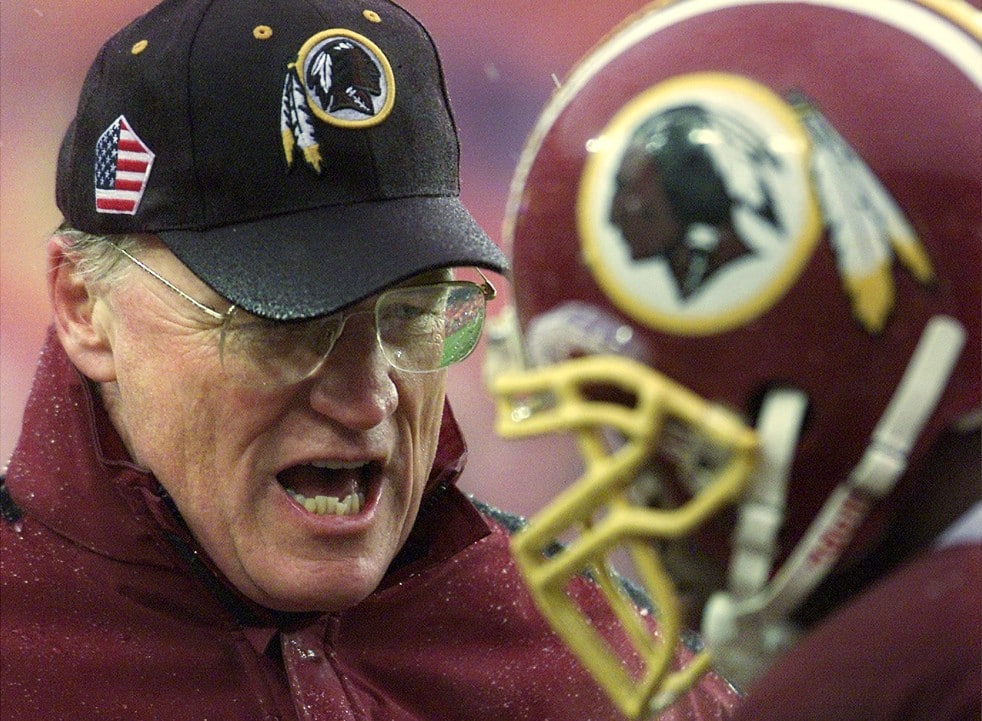Schottenheimer’s legacy can be measured in teams’ regret over letting him go

But after they met and ironed out their differences, Snyder, to his credit, let bygones be bygones. Schottenheimer’s hiring was heralded as a welcome and savvy move, at least until the first five weeks of the 2001 season.
That’s when the team got off to an embarrassing 0-5 start, matching Joe Gibbs’ horrific opening five games in his 1981 head coaching debut. And then, Schottenheimer duplicated Gibbs’ same remarkable turnaround. Both men led their teams to eight wins in the season’s last 11 games and finished 8-8, with Schottenheimer nearly getting his guys into the playoffs.
The comparison ends there. Gibbs went on to win three of the four Super Bowls his team played over his tenure from 1981 to 1992. Schottenheimer never got there, with any of the four teams he coached.
Snyder fired Schottenheimer after that single season in Washington, despite the late-season turnaround, a decision made to appear even worse by the ludicrous Steve Spurrier era that followed.
Snyder never publicly discussed why he had become so disenchanted with Schottenheirmer, who averaged 10 wins a season in his decade in Kansas City and who had just two losing seasons in his 21 years as a head coach.
Conventional wisdom in Washington centered on Schottenheimer being unwilling to yield any power after being given total control as coach and director of football operations when he was hired. A few years later, another story emerged. Schottenheimer was simply not “Snyder’s kind of guy,” several people said at the time. The young owner apparently wanted to show off his famous head coach, asking him to attend more social events and to join him for dinner at Washington’s power eateries.
Schottenheimer often said no. He was far more concerned with football, his no-distraction reputation going back to his first head coaching stint in Cleveland. He preferred to study game tape, to evaluate free agents and college prospects for the draft.
It was always about football for Schottenheimer. He grew up in western Pennsylvania, started at linebacker at Pitt and had a seven-year NFL playing career. He was a tough guy, but also admired and respected by his players and most in the media, present company included.
Sixteen days after Snyder fired him, Schottenheimer became head coach of the San Diego Chargers.
He won 200 regular season games, seventh on the NFL’s career list, and the six coaches ahead of him all are in the Pro Football Hall of Fame. The reason, if not entirely fair, why Schottenheimer isn’t: He never got to a Super Bowl, let alone won one.
Clearly, his finest work came in Kansas City. From 1989 to 1998, the Chiefs were 101—58—1 in the regular season (.634), with three division titles, seven playoff appearances, and a trip to the AFC championship game in 1993, where they lost to the Buffalo Bills.
His 5-13 playoff record includes some of the game’s most famous heartbreakers. There was the stunning 98-yard John Elway-led touchdown drive (“The Drive” in league lore) with less than two minutes left to lead Denver over Schottenheimer’s Cleveland Browns in the 1986 AFC championship game and the late, infamous Earnest Byner fumble (“The Fumble”) in the same game a year later, and several other soul-crushing close losses, as well.
Schottenheimer’s preferred style was known as “Marty Ball,” built around a dominant ground game he believed was the key to offensive success. His critics complained that too often, it meant run, run, pass on third down and either move the chains or punt.
And yet, he was revered among fans in both Kansas City and San Diego, where his final team finished 14-2 in 2006 but lost to New England by three points in a divisional playoff game. Schottenheimer and General Manager A.J. Smith had frequent disagreements, and owner Dean Spanos was not happy Schottenheirmer wanted to add several family members to his coaching staff, so he fired him.
That proved to be a big mistake for the Chargers, who have made only one playoff appearance in the past 10 years, leaving the kind of regret that still resonates among Washington fans two decades later.






